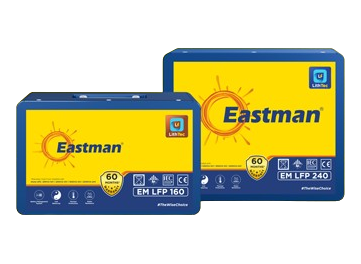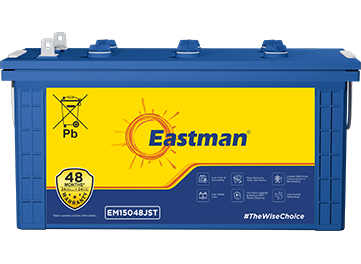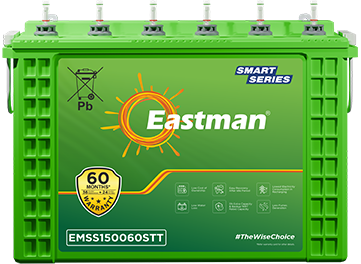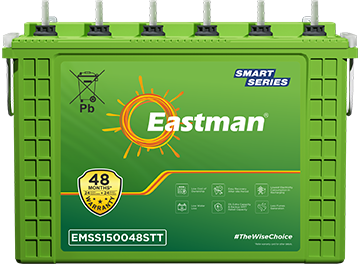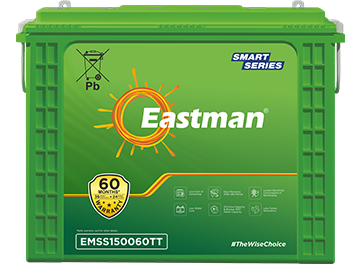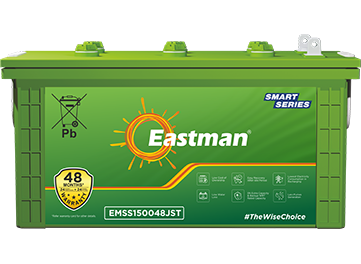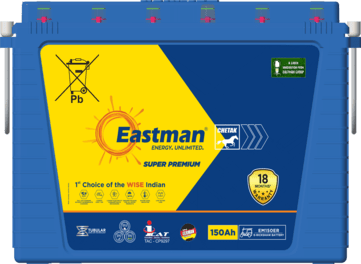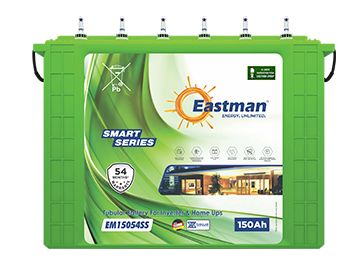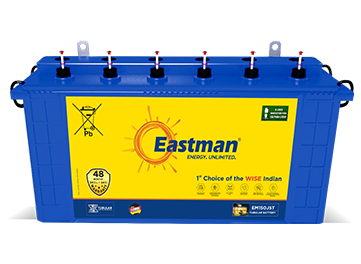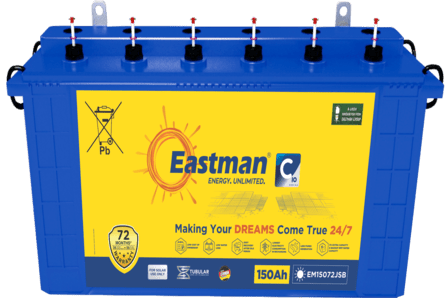EM LFP 240
Capacity: 150 Ah
Warranty: 60 Months
Technology: Lead Acid Replacement Lithium Battery
Enquire NowProduct Features
Low Cost of
Ownership
Low Water
Loss
Easy Recovery After Idle Period
Lowest Electricity Consumption in Recharging
Less Fumes
Generation
5% Extra Capacity & Backup w.r.t. Rated Capacity
Specifications
| EM LFP 240 | ||
|---|---|---|
| Capacity | 150 Ah | |
| Warranty | 60 Months | |
| Gross Weight (in KG) | 14 | |
| Battery Dimension (in mm) | 300*165*275 | |
Applications

Home

Office

Industrial Units

Hospitals

Schools

Petrol Pump
Blogs
Frequently Asked Questions
How many types of inverter batteries are there?
There are three main types of inverter batteries: tubular, flat plate, and lithium-ion. Each offers distinct advantages. Choose based on your specific power needs and preferences.
Which battery is best for inverter 150Ah or 200AH?
When deciding between a 150Ah and 200Ah inverter battery, it's crucial to consider your power usage, duration of backup needed, available space, and budget. While a 200Ah battery offers longer backup times and can handle higher power demands, a 150Ah battery may suffice for smaller setups with lower power requirements. Assess these factors carefully to make an informed decision and ensure uninterrupted power supply. Let's calculate the optimal backup time of the battery.
Backup Time of Inverter Battery = (Battery Voltage x Battery AH Rating) / Total Watts on Load
For example:
Battery voltage: 12V, Battery AH rating: 150Ah, Load requirement: 800 watts. Backup time of battery: (12 * 150) / 800 = 2.25 hours
Battery voltage: 12V, Battery AH rating: 200Ah, Load requirement: 800 watts. Backup time of battery: (12 * 200) / 800 = 3 hours.
What to look for when buying inverter battery?
When buying an inverter battery, consider factors like battery type, capacity, warranty, and maintenance requirements. Ensure compatibility with your inverter for optimal performance.
How do I keep my inverter battery healthy?
Maintain inverter battery health by regular charging, avoiding deep discharges, checking water level & replinishing it and ensuring proper ventilation. Follow manufacturer guidelines for extended lifespan.
Can we connect different capacity batteries?
It's not advisable to connect batteries of different capacities, it can potentially damage the batteries. Use batteries with the same capacity and specifications for optimal performance and longevity.
Can we add 2 batteries to inverter?
Adding 2 batteries to an inverter is possible, but they should have the same capacity and type. Moreover, your inverter should be able to support two batteries and for this you need an inverter with atleas 24V rating. Follow manufacturer recommendations for a safe and efficient setup.
Can a 200Ah battery run a fridge?
Running a fridge or any electrical device is primarily done by the invereter. A battery is source of power to the inverter. The battery capacity defines the duration of the backup based on the load begin run by the inverter. Ensure the inverter capacity meets both appliances' requirements for optimal performance.
Product Features
Low Cost of
Ownership
Low Water
Loss
Easy Recovery After Idle Period
Lowest Electricity Consumption in Recharging
Less Fumes
Generation
5% Extra Capacity & Backup w.r.t. Rated Capacity
Specifications
| EM15048JST | ||
|---|---|---|
| Capacity | 150 Ah | |
| Warranty | 24+24 Months | |
| Gross Weight (in KG) | 50.8 | |
| Battery Dimension (in mm) | 518*273*276 | |
Applications

Home

Office

Industrial Units

Hospitals

Schools

Petrol Pump
Blogs
Frequently Asked Questions
How many types of inverter batteries are there?
There are three main types of inverter batteries: tubular, flat plate, and lithium-ion. Each offers distinct advantages. Choose based on your specific power needs and preferences.
Which battery is best for inverter 150Ah or 200AH?
When deciding between a 150Ah and 200Ah inverter battery, it's crucial to consider your power usage, duration of backup needed, available space, and budget. While a 200Ah battery offers longer backup times and can handle higher power demands, a 150Ah battery may suffice for smaller setups with lower power requirements. Assess these factors carefully to make an informed decision and ensure uninterrupted power supply. Let's calculate the optimal backup time of the battery.
Backup Time of Inverter Battery = (Battery Voltage x Battery AH Rating) / Total Watts on Load
For example:
Battery voltage: 12V, Battery AH rating: 150Ah, Load requirement: 800 watts. Backup time of battery: (12 * 150) / 800 = 2.25 hours
Battery voltage: 12V, Battery AH rating: 200Ah, Load requirement: 800 watts. Backup time of battery: (12 * 200) / 800 = 3 hours.
What to look for when buying inverter battery?
When buying an inverter battery, consider factors like battery type, capacity, warranty, and maintenance requirements. Ensure compatibility with your inverter for optimal performance.
How do I keep my inverter battery healthy?
Maintain inverter battery health by regular charging, avoiding deep discharges, checking water level & replinishing it and ensuring proper ventilation. Follow manufacturer guidelines for extended lifespan.
Can we connect different capacity batteries?
It's not advisable to connect batteries of different capacities, it can potentially damage the batteries. Use batteries with the same capacity and specifications for optimal performance and longevity.
Can we add 2 batteries to inverter?
Adding 2 batteries to an inverter is possible, but they should have the same capacity and type. Moreover, your inverter should be able to support two batteries and for this you need an inverter with atleas 24V rating. Follow manufacturer recommendations for a safe and efficient setup.
Can a 200Ah battery run a fridge?
Running a fridge or any electrical device is primarily done by the invereter. A battery is source of power to the inverter. The battery capacity defines the duration of the backup based on the load begin run by the inverter. Ensure the inverter capacity meets both appliances' requirements for optimal performance.
Product Features
Low Cost of
Ownership
Low Water
Loss
Easy Recovery After Idle Period
Lowest Electricity Consumption in Recharging
Less Fumes
Generation
5% Extra Capacity & Backup w.r.t. Rated Capacity
Specifications
| EMSS150060STT | ||
|---|---|---|
| Warranty | 36+24 Months | |
| Gross Weight (in KG) | 49.0 | |
| Battery Dimension (in mm) | 502*188*352 | |
Applications

Home

Office

Industrial Units

Hospitals

Schools

Petrol Pump
Blogs
Frequently Asked Questions
How many types of inverter batteries are there?
There are three main types of inverter batteries: tubular, flat plate, and lithium-ion. Each offers distinct advantages. Choose based on your specific power needs and preferences.
Which battery is best for inverter 150Ah or 200AH?
When deciding between a 150Ah and 200Ah inverter battery, it's crucial to consider your power usage, duration of backup needed, available space, and budget. While a 200Ah battery offers longer backup times and can handle higher power demands, a 150Ah battery may suffice for smaller setups with lower power requirements. Assess these factors carefully to make an informed decision and ensure uninterrupted power supply. Let's calculate the optimal backup time of the battery.
Backup Time of Inverter Battery = (Battery Voltage x Battery AH Rating) / Total Watts on Load
For example:
Battery voltage: 12V, Battery AH rating: 150Ah, Load requirement: 800 watts. Backup time of battery: (12 * 150) / 800 = 2.25 hours
Battery voltage: 12V, Battery AH rating: 200Ah, Load requirement: 800 watts. Backup time of battery: (12 * 200) / 800 = 3 hours.
What to look for when buying inverter battery?
When buying an inverter battery, consider factors like battery type, capacity, warranty, and maintenance requirements. Ensure compatibility with your inverter for optimal performance.
How do I keep my inverter battery healthy?
Maintain inverter battery health by regular charging, avoiding deep discharges, checking water level & replinishing it and ensuring proper ventilation. Follow manufacturer guidelines for extended lifespan.
Can we connect different capacity batteries?
It's not advisable to connect batteries of different capacities, it can potentially damage the batteries. Use batteries with the same capacity and specifications for optimal performance and longevity.
Can we add 2 batteries to inverter?
Adding 2 batteries to an inverter is possible, but they should have the same capacity and type. Moreover, your inverter should be able to support two batteries and for this you need an inverter with atleas 24V rating. Follow manufacturer recommendations for a safe and efficient setup.
Can a 200Ah battery run a fridge?
Running a fridge or any electrical device is primarily done by the invereter. A battery is source of power to the inverter. The battery capacity defines the duration of the backup based on the load begin run by the inverter. Ensure the inverter capacity meets both appliances' requirements for optimal performance.
Product Features
Low Cost of
Ownership
Low Water
Loss
Easy Recovery After Idle Period
Lowest Electricity Consumption in Recharging
Less Fumes
Generation
5% Extra Capacity & Backup w.r.t. Rated Capacity
Specifications
| EMSS150048STT | ||
|---|---|---|
| Warranty | 24+24 Months | |
| Gross Weight (in KG) | 45.3 | |
| Battery Dimension (in mm) | 502*188*352 | |
Applications

Home

Office

Industrial Units

Hospitals

Schools

Petrol Pump
Blogs
Frequently Asked Questions
How many types of inverter batteries are there?
There are three main types of inverter batteries: tubular, flat plate, and lithium-ion. Each offers distinct advantages. Choose based on your specific power needs and preferences.
Which battery is best for inverter 150Ah or 200AH?
When deciding between a 150Ah and 200Ah inverter battery, it's crucial to consider your power usage, duration of backup needed, available space, and budget. While a 200Ah battery offers longer backup times and can handle higher power demands, a 150Ah battery may suffice for smaller setups with lower power requirements. Assess these factors carefully to make an informed decision and ensure uninterrupted power supply. Let's calculate the optimal backup time of the battery.
Backup Time of Inverter Battery = (Battery Voltage x Battery AH Rating) / Total Watts on Load
For example:
Battery voltage: 12V, Battery AH rating: 150Ah, Load requirement: 800 watts. Backup time of battery: (12 * 150) / 800 = 2.25 hours
Battery voltage: 12V, Battery AH rating: 200Ah, Load requirement: 800 watts. Backup time of battery: (12 * 200) / 800 = 3 hours.
What to look for when buying inverter battery?
When buying an inverter battery, consider factors like battery type, capacity, warranty, and maintenance requirements. Ensure compatibility with your inverter for optimal performance.
How do I keep my inverter battery healthy?
Maintain inverter battery health by regular charging, avoiding deep discharges, checking water level & replinishing it and ensuring proper ventilation. Follow manufacturer guidelines for extended lifespan.
Can we connect different capacity batteries?
It's not advisable to connect batteries of different capacities, it can potentially damage the batteries. Use batteries with the same capacity and specifications for optimal performance and longevity.
Can we add 2 batteries to inverter?
Adding 2 batteries to an inverter is possible, but they should have the same capacity and type. Moreover, your inverter should be able to support two batteries and for this you need an inverter with atleas 24V rating. Follow manufacturer recommendations for a safe and efficient setup.
Can a 200Ah battery run a fridge?
Running a fridge or any electrical device is primarily done by the invereter. A battery is source of power to the inverter. The battery capacity defines the duration of the backup based on the load begin run by the inverter. Ensure the inverter capacity meets both appliances' requirements for optimal performance.
Product Features
Low Cost of
Ownership
Low Water
Loss
Easy Recovery After Idle Period
Lowest Electricity Consumption in Recharging
Less Fumes
Generation
5% Extra Capacity & Backup w.r.t. Rated Capacity
Specifications
| EMSS150060TT | ||
|---|---|---|
| Warranty | 36+24 Months | |
| Gross Weight (in KG) | 54.6 | |
| Battery Dimension (in mm) | 506*192*405 | |
Applications

Home

Office

Industrial Units

Hospitals

Schools

Petrol Pump
Blogs
Frequently Asked Questions
How many types of inverter batteries are there?
There are three main types of inverter batteries: tubular, flat plate, and lithium-ion. Each offers distinct advantages. Choose based on your specific power needs and preferences.
Which battery is best for inverter 150Ah or 200AH?
When deciding between a 150Ah and 200Ah inverter battery, it's crucial to consider your power usage, duration of backup needed, available space, and budget. While a 200Ah battery offers longer backup times and can handle higher power demands, a 150Ah battery may suffice for smaller setups with lower power requirements. Assess these factors carefully to make an informed decision and ensure uninterrupted power supply. Let's calculate the optimal backup time of the battery.
Backup Time of Inverter Battery = (Battery Voltage x Battery AH Rating) / Total Watts on Load
For example:
Battery voltage: 12V, Battery AH rating: 150Ah, Load requirement: 800 watts. Backup time of battery: (12 * 150) / 800 = 2.25 hours
Battery voltage: 12V, Battery AH rating: 200Ah, Load requirement: 800 watts. Backup time of battery: (12 * 200) / 800 = 3 hours.
What to look for when buying inverter battery?
When buying an inverter battery, consider factors like battery type, capacity, warranty, and maintenance requirements. Ensure compatibility with your inverter for optimal performance.
How do I keep my inverter battery healthy?
Maintain inverter battery health by regular charging, avoiding deep discharges, checking water level & replinishing it and ensuring proper ventilation. Follow manufacturer guidelines for extended lifespan.
Can we connect different capacity batteries?
It's not advisable to connect batteries of different capacities, it can potentially damage the batteries. Use batteries with the same capacity and specifications for optimal performance and longevity.
Can we add 2 batteries to inverter?
Adding 2 batteries to an inverter is possible, but they should have the same capacity and type. Moreover, your inverter should be able to support two batteries and for this you need an inverter with atleas 24V rating. Follow manufacturer recommendations for a safe and efficient setup.
Can a 200Ah battery run a fridge?
Running a fridge or any electrical device is primarily done by the invereter. A battery is source of power to the inverter. The battery capacity defines the duration of the backup based on the load begin run by the inverter. Ensure the inverter capacity meets both appliances' requirements for optimal performance.
Product Features
Low Cost of
Ownership
Low Water
Loss
Easy Recovery After Idle Period
Lowest Electricity Consumption in Recharging
Less Fumes
Generation
5% Extra Capacity & Backup w.r.t. Rated Capacity
Specifications
| EMSS150048JST | ||
|---|---|---|
| Warranty | 24+24 Months | |
| Gross Weight (in KG) | 48.1 | |
| Battery Dimension (in mm) | 518*273*276 | |
Applications

Home

Office

Industrial Units

Hospitals

Schools

Petrol Pump
Blogs
Frequently Asked Questions
How many types of inverter batteries are there?
There are three main types of inverter batteries: tubular, flat plate, and lithium-ion. Each offers distinct advantages. Choose based on your specific power needs and preferences.
Which battery is best for inverter 150Ah or 200AH?
When deciding between a 150Ah and 200Ah inverter battery, it's crucial to consider your power usage, duration of backup needed, available space, and budget. While a 200Ah battery offers longer backup times and can handle higher power demands, a 150Ah battery may suffice for smaller setups with lower power requirements. Assess these factors carefully to make an informed decision and ensure uninterrupted power supply. Let's calculate the optimal backup time of the battery.
Backup Time of Inverter Battery = (Battery Voltage x Battery AH Rating) / Total Watts on Load
For example:
Battery voltage: 12V, Battery AH rating: 150Ah, Load requirement: 800 watts. Backup time of battery: (12 * 150) / 800 = 2.25 hours
Battery voltage: 12V, Battery AH rating: 200Ah, Load requirement: 800 watts. Backup time of battery: (12 * 200) / 800 = 3 hours.
What to look for when buying inverter battery?
When buying an inverter battery, consider factors like battery type, capacity, warranty, and maintenance requirements. Ensure compatibility with your inverter for optimal performance.
How do I keep my inverter battery healthy?
Maintain inverter battery health by regular charging, avoiding deep discharges, checking water level & replinishing it and ensuring proper ventilation. Follow manufacturer guidelines for extended lifespan.
Can we connect different capacity batteries?
It's not advisable to connect batteries of different capacities, it can potentially damage the batteries. Use batteries with the same capacity and specifications for optimal performance and longevity.
Can we add 2 batteries to inverter?
Adding 2 batteries to an inverter is possible, but they should have the same capacity and type. Moreover, your inverter should be able to support two batteries and for this you need an inverter with atleas 24V rating. Follow manufacturer recommendations for a safe and efficient setup.
Can a 200Ah battery run a fridge?
Running a fridge or any electrical device is primarily done by the invereter. A battery is source of power to the inverter. The battery capacity defines the duration of the backup based on the load begin run by the inverter. Ensure the inverter capacity meets both appliances' requirements for optimal performance.
Product Features
Low Cost of
Ownership
Low Water
Loss
Easy Recovery After Idle Period
Lowest Electricity Consumption in Recharging
Less Fumes
Generation
5% Extra Capacity & Backup w.r.t. Rated Capacity
Specifications
| EM150ER JXL | ||
|---|---|---|
| Capacity | 150 Ah | |
| Warranty | 18 Months | |
| Gross Weight (in KG) | 43.5 | |
| Battery Dimension (in mm) | 411x190x275 | |
Applications

Home

Office

Industrial Units

Hospitals

Schools

Petrol Pump
Blogs
Frequently Asked Questions
How many types of inverter batteries are there?
There are three main types of inverter batteries: tubular, flat plate, and lithium-ion. Each offers distinct advantages. Choose based on your specific power needs and preferences.
Which battery is best for inverter 150Ah or 200AH?
When deciding between a 150Ah and 200Ah inverter battery, it's crucial to consider your power usage, duration of backup needed, available space, and budget. While a 200Ah battery offers longer backup times and can handle higher power demands, a 150Ah battery may suffice for smaller setups with lower power requirements. Assess these factors carefully to make an informed decision and ensure uninterrupted power supply. Let's calculate the optimal backup time of the battery.
Backup Time of Inverter Battery = (Battery Voltage x Battery AH Rating) / Total Watts on Load
For example:
Battery voltage: 12V, Battery AH rating: 150Ah, Load requirement: 800 watts. Backup time of battery: (12 * 150) / 800 = 2.25 hours
Battery voltage: 12V, Battery AH rating: 200Ah, Load requirement: 800 watts. Backup time of battery: (12 * 200) / 800 = 3 hours.
What to look for when buying inverter battery?
When buying an inverter battery, consider factors like battery type, capacity, warranty, and maintenance requirements. Ensure compatibility with your inverter for optimal performance.
How do I keep my inverter battery healthy?
Maintain inverter battery health by regular charging, avoiding deep discharges, checking water level & replinishing it and ensuring proper ventilation. Follow manufacturer guidelines for extended lifespan.
Can we connect different capacity batteries?
It's not advisable to connect batteries of different capacities, it can potentially damage the batteries. Use batteries with the same capacity and specifications for optimal performance and longevity.
Can we add 2 batteries to inverter?
Adding 2 batteries to an inverter is possible, but they should have the same capacity and type. Moreover, your inverter should be able to support two batteries and for this you need an inverter with atleas 24V rating. Follow manufacturer recommendations for a safe and efficient setup.
Can a 200Ah battery run a fridge?
Running a fridge or any electrical device is primarily done by the invereter. A battery is source of power to the inverter. The battery capacity defines the duration of the backup based on the load begin run by the inverter. Ensure the inverter capacity meets both appliances' requirements for optimal performance.
Product Features
Low Cost of
Ownership
Low Water
Loss
Easy Recovery After Idle Period
Lowest Electricity Consumption in Recharging
Less Fumes
Generation
5% Extra Capacity & Backup w.r.t. Rated Capacity
Specifications
| EM15054SS | ||
|---|---|---|
| Warranty | 30+24 Months | |
| Gross Weight (in KG) | 57.7 | |
| Battery Dimension (in mm) | 525*215*475 | |
Applications

Home

Office

Industrial Units

Hospitals

Schools

Petrol Pump
Blogs
Frequently Asked Questions
How many types of inverter batteries are there?
There are three main types of inverter batteries: tubular, flat plate, and lithium-ion. Each offers distinct advantages. Choose based on your specific power needs and preferences.
Which battery is best for inverter 150Ah or 200AH?
When deciding between a 150Ah and 200Ah inverter battery, it's crucial to consider your power usage, duration of backup needed, available space, and budget. While a 200Ah battery offers longer backup times and can handle higher power demands, a 150Ah battery may suffice for smaller setups with lower power requirements. Assess these factors carefully to make an informed decision and ensure uninterrupted power supply. Let's calculate the optimal backup time of the battery.
Backup Time of Inverter Battery = (Battery Voltage x Battery AH Rating) / Total Watts on Load
For example:
Battery voltage: 12V, Battery AH rating: 150Ah, Load requirement: 800 watts. Backup time of battery: (12 * 150) / 800 = 2.25 hours
Battery voltage: 12V, Battery AH rating: 200Ah, Load requirement: 800 watts. Backup time of battery: (12 * 200) / 800 = 3 hours.
What to look for when buying inverter battery?
When buying an inverter battery, consider factors like battery type, capacity, warranty, and maintenance requirements. Ensure compatibility with your inverter for optimal performance.
How do I keep my inverter battery healthy?
Maintain inverter battery health by regular charging, avoiding deep discharges, checking water level & replinishing it and ensuring proper ventilation. Follow manufacturer guidelines for extended lifespan.
Can we connect different capacity batteries?
It's not advisable to connect batteries of different capacities, it can potentially damage the batteries. Use batteries with the same capacity and specifications for optimal performance and longevity.
Can we add 2 batteries to inverter?
Adding 2 batteries to an inverter is possible, but they should have the same capacity and type. Moreover, your inverter should be able to support two batteries and for this you need an inverter with atleas 24V rating. Follow manufacturer recommendations for a safe and efficient setup.
Can a 200Ah battery run a fridge?
Running a fridge or any electrical device is primarily done by the invereter. A battery is source of power to the inverter. The battery capacity defines the duration of the backup based on the load begin run by the inverter. Ensure the inverter capacity meets both appliances' requirements for optimal performance.
Product Features
Low Cost of
Ownership
Low Water
Loss
Easy Recovery After Idle Period
Lowest Electricity Consumption in Recharging
Less Fumes
Generation
5% Extra Capacity & Backup w.r.t. Rated Capacity
Specifications
| EM150JST | ||
|---|---|---|
| Capacity | 150 Ah | |
| Warranty | 24+24 Months | |
| Gross Weight (in KG) | 53.2 | |
| Battery Dimension (in mm) | 545*295*345 | |
Applications

Home

Office

Industrial Units

Hospitals

Schools

Petrol Pump
Blogs
Frequently Asked Questions
How many types of inverter batteries are there?
There are three main types of inverter batteries: tubular, flat plate, and lithium-ion. Each offers distinct advantages. Choose based on your specific power needs and preferences.
Which battery is best for inverter 150Ah or 200AH?
When deciding between a 150Ah and 200Ah inverter battery, it's crucial to consider your power usage, duration of backup needed, available space, and budget. While a 200Ah battery offers longer backup times and can handle higher power demands, a 150Ah battery may suffice for smaller setups with lower power requirements. Assess these factors carefully to make an informed decision and ensure uninterrupted power supply. Let's calculate the optimal backup time of the battery.
Backup Time of Inverter Battery = (Battery Voltage x Battery AH Rating) / Total Watts on Load
For example:
Battery voltage: 12V, Battery AH rating: 150Ah, Load requirement: 800 watts. Backup time of battery: (12 * 150) / 800 = 2.25 hours
Battery voltage: 12V, Battery AH rating: 200Ah, Load requirement: 800 watts. Backup time of battery: (12 * 200) / 800 = 3 hours.
What to look for when buying inverter battery?
When buying an inverter battery, consider factors like battery type, capacity, warranty, and maintenance requirements. Ensure compatibility with your inverter for optimal performance.
How do I keep my inverter battery healthy?
Maintain inverter battery health by regular charging, avoiding deep discharges, checking water level & replinishing it and ensuring proper ventilation. Follow manufacturer guidelines for extended lifespan.
Can we connect different capacity batteries?
It's not advisable to connect batteries of different capacities, it can potentially damage the batteries. Use batteries with the same capacity and specifications for optimal performance and longevity.
Can we add 2 batteries to inverter?
Adding 2 batteries to an inverter is possible, but they should have the same capacity and type. Moreover, your inverter should be able to support two batteries and for this you need an inverter with atleas 24V rating. Follow manufacturer recommendations for a safe and efficient setup.
Can a 200Ah battery run a fridge?
Running a fridge or any electrical device is primarily done by the invereter. A battery is source of power to the inverter. The battery capacity defines the duration of the backup based on the load begin run by the inverter. Ensure the inverter capacity meets both appliances' requirements for optimal performance.
Product Features
Low Cost of
Ownership
Low Water
Loss
Easy Recovery After Idle Period
Lowest Electricity Consumption in Recharging
Less Fumes
Generation
5% Extra Capacity & Backup w.r.t. Rated Capacity
Specifications
| EM15072-JSB | ||
|---|---|---|
| Capacity | 150 Ah | |
| Warranty | 36+36 Months | |
| Gross Weight (in KG) | 52.5 ±5% | |
| Battery Dimension (in mm) | 518 * 273 * 276 | |
Applications

Home

Office

Industrial Units

Hospitals

Schools

Petrol Pump
Blogs
Frequently Asked Questions
What is a solar battery?
A solar battery stores excess energy from solar panels for later use, typically during periods of low sunlight or at night
Are solar batteries safe?
Yes, solar batteries are safe when installed and used properly, with built-in safety features to prevent overcharging, overheating, and short circuits.
What can damage solar battery?
Solar batteries can be damaged by overcharging, deep discharges, extreme temperatures, physical damage, and improper maintenance or installation.
Do solar batteries get hot?
Solar batteries may generate some heat during charging and discharging processes, but proper ventilation and cooling systems are usually in place to prevent overheating.
Do solar batteries go dead?
Solar batteries can lose their charge over time if not properly maintained or used, but they can be recharged using solar panels or other charging sources.
Can solar battery last all night?
Depending on the capacity & efficiency of the battery system and your power consumption, some solar batteries can provide enough stored energy to last through the night, especially when combined with energy-efficient appliances and systems.
Can solar batteries freeze?
Yes, solar batteries can freeze in extremely cold temperatures, potentially causing damage to the battery cells and reducing performance. Proper insulation and temperature control mechanisms can mitigate this risk.
Do solar batteries need ventilation?
Yes, proper ventilation is essential for solar batteries to dissipate heat generated during charging and discharging processes, ensuring optimal performance and longevity.
What reduces solar battery life?
Factors such as overcharging, deep discharges, high temperatures, poor ventilation, and lack of maintenance can reduce the lifespan of solar batteries.
Do solar batteries work in winter?
Yes, solar batteries can still function in winter, although their backup may be reduced due to fewer daylight hours and lower temperatures. Proper insulation and system design can help mitigate these effects.
What is the difference between normal battery and a solar battery?
Solar batteries are designed specifically for use with solar energy systems, featuring deep cycle capabilities and optimized for charging and discharging cycles compared to regular batteries.
c10 or c20? Which one is better
C10 is better and is setting the standard for superior performance!
How to maintain your Solar Battery?
Maintain your solar battery by ensuring regular inspections, keeping it clean, avoiding overcharging and deep discharges, monitoring DoD levels, maintaining proper ventilation, and following manufacturer guidelines for maintenance and storage.
Are Eastman Solar Batteries BIS certifed?
Yes, Eastman Solar Batteries are BIS (Bureau of Indian Standards) certified, ensuring compliance with safety and quality standards for solar energy storage solutions.
What is the warranty of Eastman Solar Batteries?
The warranty period for Eastman Solar Batteries typically ranges from 72 months to 120 months, depending on the specific model and terms provided by the manufacturer. Please refer to the warranty documentation for specific details.
Are Eastman Solar Batteries C10 rated?
Absolutely, Eastman Solar Batteries are C10 rated
What are the best features of Eastman Solar batteries?
The best features of Eastman Solar batteries include low cost of ownership, minimal water loss, easy recovery after idle periods, lower electricity consumption during recharging, and reduced fumes generation. Additionally, they offer an impressive 5% extra capacity and backup compared to their rated capacity, ensuring reliable and efficient power storage for solar applications.
What is the highest warranty of Eastman Solar batteries?
The highest warranty for Eastman Solar batteries is 120 months.


